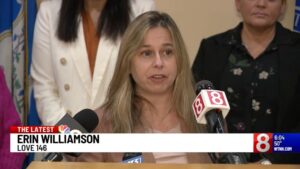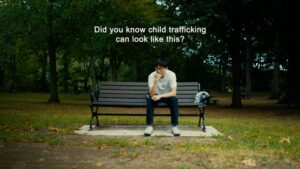What does justice look like for the youth in our care? For one youth in our U.S. survivor care program, justice includes having the person who trafficked and abused her convicted, sentenced, and publicly admonished by a judge.
Of the hundreds of youth reached by Love146 in the U.S., this survivor stands out as being one of the most traumatized and impacted by the horror of what she experienced. She talks about being forced to engage in unspeakable acts that forever changed the course of her life. These crimes will forever impact her.
In order to avoid a trial in which she’d have to testify in front of a jury, the trafficker agreed to the reduced charges of Sexual Assault in the Second degree and Unlawful Restraint in the First degree. The agreed upon sentence for this plea deal is 15 years of jail, suspended after the he serves 8 years in jail, followed by 15 years of probation. He will also be added to the sex offender registry, and prohibited from contacting her for 40 years.
At his sentencing, I had the opportunity to read a statement on behalf of this youth. Having heard the details of the nightmare this man put her through, I was determined to confront him directly with his crimes. With this youth in mind, I locked eyes with her abuser.
I have been working with the youth since 2014, I told him and the court:
The impact of what you did to her has been significant. When I first met her she was hospitalized as a result of the trauma she experienced at your hands. She would wonder why she was “locked up” in the hospital while you were still “free.”
She continued to feel imprisoned even after your arrest — from her memories, nightmares, and flashbacks.
She is often reminded of your abuse. Her body is always alert, anticipating that at any moment she could be re-victimized. She told me that she doesn’t have control over what happens to her body because she was unable to control or stop what you inflicted on her. She’s not sure who she can and should trust, and is very confused about what constitutes a healthy relationship. She knows she has experienced something that most children her age cannot even fathom, and as a result she struggles in her relationships with peers, family, teachers, and other individuals.
You should not be free while she continues to be imprisoned by the violence you inflicted.
At the sentencing, the judge wanted to make sure that the trafficker understood that the plea deal was made in an effort to protect the victim and not as a reflection of the crimes he had committed. The judge addressed him directly:
“If you were convicted after a trial, the numbers here would be much, much greater than this, with those allegations, if they were proven,” he began.
“We know there’s going to be long-term emotional damage to this child, but then to have her testify in a public forum in front of a jury, we know that would be difficult for her, subject to cross examination, so I know she’s happy, whatever that means. …”
“But this certainly was despicable treatment of a child who … was a perfect victim for … somebody like you, and you manipulated and exploited a troubled youth to your sexual perversions… I think it’s an appropriate disposition, obviously, short of exposing this child to testifying.”

 Parenting
Parenting

